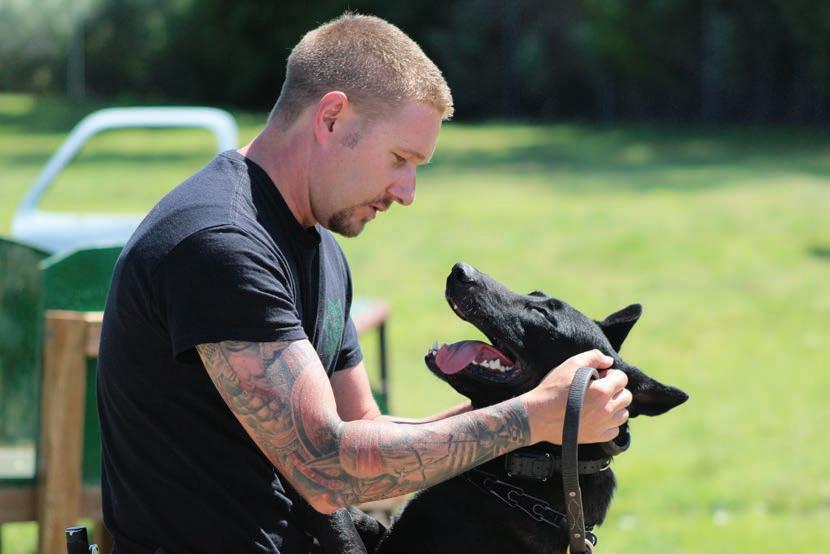
3 minute read
BEST FRIEND
trainer, said his unit is now fully staffed again with seven dog-handler pairs and one decoy. Six dogs — including Ragnar and Rico — are dual-purpose for narcotics detection and patrol. The seventh is a bomb-sniffing dog for the courthouse, he said.
The K-9 unit responds to an incredibly large call volume, including helping local agencies that don’t have their own K-9 units.
“We stay busy,” Valbert continued. “ … (Being fully staffed) keeps us at 24-7 coverage.”
Valbert, Oliver and Wagner all emphasized how this wouldn’t have been possible without the tremendous community support JCSO received after Graffit’s death.
Companies and individuals from Jeffco and beyond donated money, dog treats, and more in Graffit’s honor. The monetary donations enabled the office to buy the two new K-9s — each of which was $20,000 including training and travel — along with ballistic vests and other crucial equipment.
Oliver thanked everyone for their support and donations, saying, “I felt like I wasn’t alone, that the community cared about (Graffit) too.”
While Oliver stressed that no one could replace Graffit, he said it was great to have a K-9 partner once more. He and his family members feel better now that he has someone going to work with him again.
Ragnar, a 2-year-old Belgian Malinois, is adjusting to home life well. He has “a good on-off switch,” Oliver described, saying he’s always excited to go to work.
Oliver was among the JCSO personnel who went to California to scope out new K-9s. They were looking for dogs that were at least a year old and that would be good fits for the sheriff’s office and their respective handlers.
Oliver liked how methodical Ragnar was, saying, “He’s focused, calm and clear-headed.”

For Rico and Wagner, the last six weeks of training have been a fun, new journey together.
“He’s a puppy still,” Wagner said of the 14-month-old Belgian Malinois. “He’s always wanting to play and work.”
To help Rico differentiate between home and work, Wagner said he has separate collars. So, when Rico gets his work collar on and jumps in the patrol vehicle, Wagner said he knows he’s going to work.



Rico’s been solid in training, Wagner said, describing how he’s been especially quick on the narcotics detection side thus far. The pair should be fully trained by late September, he anticipated.
“He’s willing and quick to learn,” Wagner said of his new K-9 partner.
For K-9 Graffit

In the early hours on Feb. 13, Oliver and Graffit responded to a call near the Colorado School of Mines campus in Golden.
A suspected drunken driver had evaded police, reportedly pointing a gun at a Golden Police officer during the incident, and was last seen running toward the Mines campus.
According to court documents, Oliver and Graffit tracked the suspect to a wooded area, with Oliver releasing Graffit with commands to apprehend. The suspect, later identified as 29-year-old Eduardo Romero, then reportedly shot Graffit, killing him.
Graffit, a 10-year-old German shepherd, had been with the Jeffco Sheriff’s Office since 2015. He was honored with a procession from the site, temporary memorial sites at JCSO headquarters and the Mines campus, and a Feb. 27 memorial service.
Romero was later arrested without incident and charged with several counts, including aggravated cruelty to animals, class-6 felony. This is the lowest-level felony, and carries a sentence of up 18 months in jail and a fine of up to $100,000.
Romero’s scheduled to enter a plea at 1 p.m. Aug. 7 at the Jefferson County Courthouse. In the wake of Graffit’s death, Oliver and JCSO partnered with state lawmakers to increase the penalties and fines in aggravated animal cruelty cases.
House Majority Leader Monica Duran, DWheat Ridge, and Representative Ryan Armagost, R-Berthoud, sponsored House Bill 1286, which was signed June 2.
According to the final language, anyone convicted of aggravated animal cruelty toward service animals, police dogs or police horses must pay a mandatory minimum fine of $2,000 and complete an anger management treatment program. They must also make restitution to the owner or agency, including veterinary expenses and/or replacement costs.
In April, Armagost told Colorado Politics how many states have enacted harsher penalties for killing a K-9. Armagost also detailed how replacing a K-9 isn’t about just the dog itself, but the breadth and intensity of training the dog has completed.

Oliver described how he testified in favor of House Bill 1286, saying he wanted to see harsher penalties for anyone who hurts or kills a service animal or working police animal. He again thanked community members for all their support, saying he and Wagner are excited to serve Jefferson County with their new K-9 partners.
“I’m looking forward to seeing what the future holds for us,” Oliver continued.




